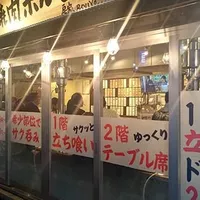1人 で やき 肉 。。。(n4)Yakinikualone
ひとり|||にく||
||grilling|||alone
Yakiniku allein ... (n 4) Yakiniku allein
Yakiniku alone ... (n 4) (n 4) Yakiniku alone
Yakiniku solo ...(n 4) Yakiniku solo
Yakiniku seul ...(n 4) Yakiniku seul
Yakiniku solo ...(n 4) Yakiniku solo
1人 で 焼肉 ...(n 4) Yakiniku alone
Yakiniku alleen ... (n 4) Yakiniku alleen
Yakiniku sozinho ...(n 4) Yakiniku sozinho
Yakiniku alone ... (n 4) Yakiniku alone
Yakiniku alone ...(n 4) 单独烧肉
Yakiniku alone ...(n 4) 单独烧肉
とつぜん お 肉 を 食べ たく なる 時 ありません か。
||にく||たべ|||とき||
suddenly|||||want to||||
Hatten Sie jemals plötzlich Heißhunger auf Fleisch?
Have you ever had a sudden craving for meat?
Avez-vous déjà eu une envie soudaine de viande ?
갑자기 고기가 먹고 싶을 때가 있지 않나요?
Har du noen gang plutselig lyst til å spise kjøtt?
Você já teve um desejo repentino de comer carne?
У вас когда-нибудь возникала внезапная тяга к мясу?
你有没有发现自己突然想吃肉?
你有沒有發現自己突然想吃肉?
日本 には 、 やき 肉 と いう 料理 が あります。
にほん|には|||にく|||りょうり|
In Japan, there is a dish called grilled meat.
No Japão, existe um prato chamado carne grelhada.
在日本,有一種菜叫做烤肉。
バーベキュー と にて います が 、 やき 肉 は 外 じゃなく 店 の 中 で お 肉 を や いて 食べます。
|||||||にく|は|そと||みせ||ちゅう|||にく|||
barbecue|and|at|||||||not||||||||||
We are having a barbecue party, but we cook the meat inside the restaurant instead of outside.
바비큐와 함께 있지만, 구운 고기는 밖이 아닌 가게 안에서 고기를 구워 먹는다.
Det kalles en grill, men kjøttet tilberedes og spises inne i restauranten i stedet for ute.
Это называется барбекю, но якинику готовят на гриле и едят внутри ресторана, а не снаружи.
虽然叫烧烤,但是肉是在餐厅里煮熟吃的,而不是在外面。
雖然叫燒烤,但肉是在餐廳裡煮熟吃的,而不是在外面。
この お店 は 、 一人で 入れる お店 です。
|おみせ|は||ひとりで|いれる|おみせ
|||alone|enter||
Dieser Laden ist ein Laden, den Sie alleine betreten können.
This restaurant is suitable for dining alone.
这家商店是一间只能一个人进入的商店。
這家商店是一間只能一個人進入的商店。
カウンター で 注文 したり お 肉 を やいたり して 食事 できます。
||ちゅうもん|||にく||||しょくじ|
counter|||||||grilled|||able to
Sie können an der Theke bestellen oder das Fleisch zum Essen grillen.
You can order at the counter and cook your meat to enjoy your meal.
카운터에서 주문하거나 고기를 구워 먹을 수 있습니다.
Вы можете заказать мясо на стойке или приготовить его на гриле.
您可以在柜台点餐并烤肉来吃。
您可以在櫃檯點餐並烤肉來吃。
メニュー から 食べ たい お 肉 を えらびます。
||たべ|||にく||
|||||||choose
Choose the meat you want to eat from the menu.
Выберите мясо, которое вы хотите съесть из меню.
从菜单中选择您想吃的肉。
從菜單中選擇您想吃的肉。
たくさん の お 肉 の しゅるい が あります。
|||にく||||
There are many kinds of meat.
私 は 、 " ロース 「 と 」 カルビ 「 を 注文 しました。
わたし|は||||||
||beef||short rib|||
I ordered "Roast" and "Kalbi".
我点了“腰肉”和“卡尔比”。
我點了「腰肉」和「卡爾比」。
やき 肉 の 準備 が できました。
|にく||じゅんび||
Das gegrillte Fleisch Junbi ist fertig.
The grilled meat junbi is ready.
烤肉就准备好了。
烤肉就準備好了。
一人で 「 いただきます。 "
ひとりで|
"Itadakimasu" alone.
单独“Itadakimasu”。
目の前 に ある てっぱん で お 肉 を やきます。
めのまえ||||||にく||
|||counter|||||grill
Das Fleisch wird vor Ihnen auf dem Teppan gegrillt.
The meat is grilled on the teppan in front of you.
눈앞에 있는 철판에서 고기를 구워 먹는다.
Kjøttet grilles på grillen rett foran deg.
Мясо жарится на тэппане перед вами.
肉是在您面前的烤架上烤的。
肉是在您面前的烤架上烤的。
女性 も 安心 して 入る ことができる お店 です。
じょせい||あんしん||はいる||おみせ|
||at ease|||||
Es ist ein Geschäft, in das Frauen beruhigt eintreten können.
It is a shop where women can enter with peace of mind.
Dette er en butikk hvor også kvinner kan føle seg trygge.
Женщины могут спокойно заходить в магазин.
这是一家让女性也能感到安全的商店。
這是一家女性也可以放心進入的商店。
食べ たい|注文 したり|食事 できます|食べ たく なる|安心 して|注文 しました

